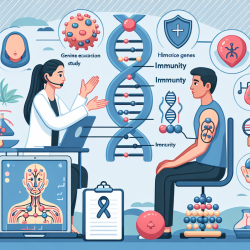Key Findings from the Study
The study identified nine new risk loci associated with CLL by performing a meta-analysis of six genome-wide association studies (GWAS). These loci are located at:- 1p36.11 (rs34676223)
- 1q42.13 (rs41271473)
- 4q24 (rs71597109)
- 4q35.1 (rs57214277)
- 6p21.31 (rs3800461)
- 11q23.2 (rs61904987)
- 18q21.1 (rs1036935)
- 19p13.3 (rs7254272)
- 22q13.33 (rs140522)
Implications for Online Therapy Practitioners
Understanding the genetic predispositions to CLL can significantly impact how online therapy practitioners approach their sessions. Here are some ways to implement the findings:Personalized Therapy Plans
Knowing that certain genetic loci are associated with CLL allows practitioners to develop more personalized therapy plans. For example, if a client has a family history of CLL, practitioners can be more vigilant and tailor their interventions accordingly.Focus on Immune System Health
Since the study highlights the role of immunity genes in CLL, online therapists can emphasize the importance of immune system health in their sessions. This can include advising on lifestyle changes, dietary recommendations, and stress management techniques that boost immunity.Incorporate Genetic Counseling
Online therapy practitioners can collaborate with genetic counselors to provide comprehensive care. Understanding a client's genetic predisposition can help in early detection and better management of CLL.Encouraging Further Research
The study also opens avenues for further research, which can be beneficial for practitioners looking to stay updated with the latest developments. Here are some areas for future research:Exploring Other Genetic Variants
While the study identified nine new loci, there are likely more genetic variants that contribute to CLL. Further research can help uncover these, providing a more comprehensive understanding of the disease.Functional Studies
The study suggests that the identified loci annotate regulatory regions that impact CLL risk through modulation of enhancer or promoter activity. Functional studies can help understand the exact mechanisms by which these loci influence CLL development.Gene-Environment Interactions
Understanding how genetic predispositions interact with environmental factors can provide deeper insights into CLL risk and progression. This can help in developing more effective prevention and treatment strategies.Conclusion
The findings from the genome-wide association analysis provide valuable insights into the genetic factors contributing to CLL. Online therapy practitioners can leverage these insights to develop personalized therapy plans, focus on immune system health, and incorporate genetic counseling. Encouraging further research in this area can also help in uncovering more genetic variants and understanding the mechanisms behind CLL.To read the original research paper, please follow this link: Genome-wide association analysis implicates dysregulation of immunity genes in chronic lymphocytic leukaemia.










